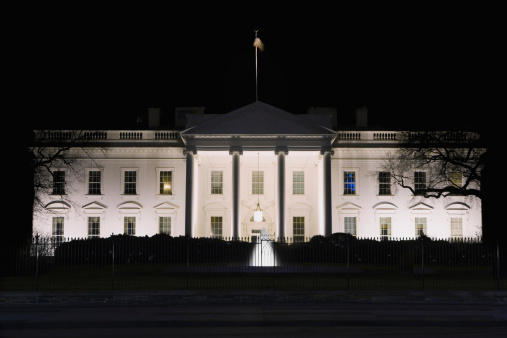The norms, rules, regulations, and laws of conduct for 21st-century government are complex and at times arcane, and President Trump’s White House flouts them with such regularity and speed that single episodes no longer seem to make much of an impression—if they even rise to the surface at all. If anyone thing catches the public notice, it’s quickly buried in an avalanche of tweets, crises, and new outrages.
Sometimes it takes a much more straightforward scandal, instantly grasped by those without a background in the minutiae of the federal code, to reveal subtler but equally troubling malfeasance. Stub your toe on a rock…and if you turn it over you may find all kinds of nasty things writhing underneath.
Which brings us to the domestic abuse accusations, with photographic evidence, against Rob Porter, the recently departed White House staff secretary.
It quickly came out that Porter had failed to gain the appropriate security clearance for his White House job—at least in part because of these allegations (and a related restraining order), which became known to the FBI in the course of conducting a background check on him. At least one person familiar with White House clearance procedures speculates that even his interim clearance may have expired in mid-January.
The staff secretary typically has daily responsibility for handling materials requiring the highest level of security clearance—materials to which perhaps only the president, his chief of staff, and the national security adviser might also have access.
The Porter scandal is still unfolding in various dimensions, including the questions it raises about the administration’s tolerance towards domestic abuse, its inability to get its story straight about what it knew and when, and the larger questions this raises about its laxity towards clearance requirements for top White House posts.
More to come, we are sure. But speaking of security clearances, materials requiring the highest level of clearance, and the president, maybe you noticed two stories that ran in last week’s Washington Post, one about how the president seldom, if ever, reads the President’s Daily Brief, which is among the crown jewels of sensitive intelligence materials…the other about how
Jared Kushner, the son-in-law with the ever-shifting portfolio, does read it.
Kushner is allowed access to this kind of top-level intelligence—he reportedly requests more information from intelligence agencies than any White House staffer not on the National Security Council—with only an interim clearance. There are serious questions about whether he will be able to gain permanent clearance, for reasons that could range from the dozens of amendments he has needed to make to his disclosure forms (having omitted both financial interests and over 100 foreign contacts, including meetings with various Russians), to his ever-increasing debt, to the possibility he is on the radar of Special Counsel Robert Mueller’s probe into Russian election interference.
Kushner’s high-level access persists despite Trump’s own director of national intelligence, Dan Coats, seeming to suggest in a congressional hearing that it should not. It persists despite the head of a government bureau with responsibility for background checks testifying that he had “never seen [the] level of mistakes” he’d seen in Kushner’s disclosure forms. And its persistence, in the person of the president’s son-in-law, may be a factor in why the White House has been slow to remove personnel who have not yet gained permanent clearance—despite White House Chief of Staff John Kelly’s apparent intention to start addressing this issue, involving scores of White House employees, this past fall. Now Kelly is, reportedly, undertaking an “overhaul” of the clearance process, while also attempting to imply that FBI procedures are partially to blame.
Speaking of Kelly’s less-than-timely closing of the barn door, remember last October’s revelation that his own cell phone may have been hacked, for a span that may have overlapped his tenure as secretary of homeland security and his current job? Last month he finally got around to banning personal phones in the West Wing. This probably would have been a good thing to do from the start and may have been done, had Trump not fired the White House Chief Information Security Officer (CISO), an Obama holdover, for reasons unclear. Also unclear is whether commensurate responsibility for protecting the White House from cyber threats has ever been handed over to another person. Yep—that last link is the government URL for the CISO position and yep, clicking on it yields a 404 error.
The security lapses that were so glaringly apparent from the beginning, from the Mar-a-Lago huddle with the Japanese prime minister to Trump’s off-the-cuff Oval Office spilling of highly-classified intelligence to Russian officials, to White House officials’ persistently lackadaisical use of personal email for government business despite National Security Agency warnings…appear to be the norm for this administration, as it enters its second year.
That last one, use of personal email for government business, sure has a familiar ring to it, doesn’t it? I guess candidate Donald Trump’s routine and enthusiastic pillorying of Hillary Clinton for such transgressions was nothing more than a bunch of attack lines. Candidate Trump talked the intelligence security talk; President Trump has been an abysmal failure at walking that walk.
In a White House where everything else seemed to be on the up-and-up, these lapses would represent a grave and pressing concern. In this White House, up to its eyeballs in scandal and corruption—including a special prosecutor probe into its dealings with Russia—it’s nothing short of a national crisis.



